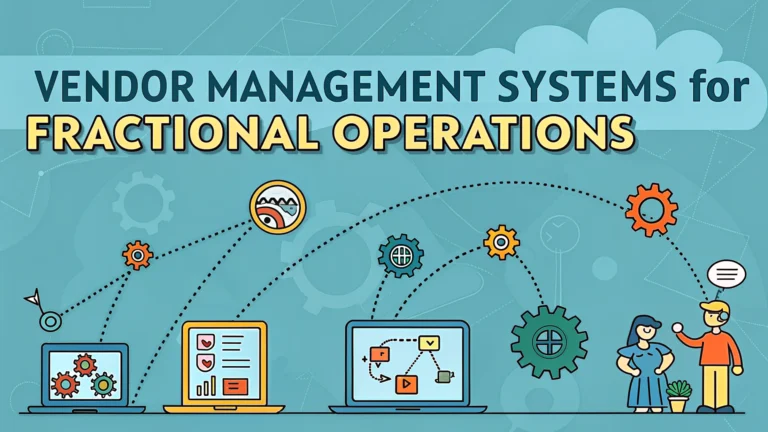Managing vendor relationships and operations efficiently becomes more complex when working with fractional executives and teams.
Vendor Management Systems (VMS) specifically designed for fractional operations help streamline processes, reduce costs, and maintain consistent service delivery across multiple part-time leadership roles.
This guide examines the most effective VMS solutions and strategies for organizations utilizing fractional talent, with a focus on practical implementation steps and real-world applications.
Key Components of VMS for Fractional Operations
- Contract Management & Documentation
- Time Tracking & Resource Allocation
- Performance Metrics & Reporting
- Payment Processing & Invoicing
- Compliance & Risk Management
Recommended VMS Platforms for Fractional COOs
- SAP Fieldglass – Excellent for enterprise-level operations (www.fieldglass.com)
- Beeline VMS – Strong analytics capabilities (www.beeline.com)
- PRO Unlimited – Specialized in professional services management
- WorkMarket – Built for managing freelance workforces
Implementation Steps
- Assessment of Current Vendor Relationships
- Platform Selection Based on Organizational Needs
- Data Migration & System Integration
- User Training & Documentation
- Performance Monitoring & Optimization
Best Practices for VMS Success
- Establish clear communication protocols between vendors and internal teams
- Implement standardized onboarding procedures for new fractional executives
- Regular system audits and compliance checks
- Maintain detailed documentation of all vendor interactions
Cost Management Strategies
| Strategy | Potential Savings |
|---|---|
| Vendor Consolidation | 15-25% |
| Automated Processing | 10-20% |
| Rate Standardization | 5-15% |
Integration with Existing Systems
Common integration points include:
- Enterprise Resource Planning (ERP) systems
- Human Resource Information Systems (HRIS)
- Financial Management Software
- Project Management Tools
Security Considerations
- Multi-factor authentication requirements
- Role-based access control
- Data encryption standards
- Regular security audits
Moving Forward with VMS Implementation
Success in implementing a VMS for fractional operations depends on selecting the right platform, following implementation best practices, and maintaining strong vendor relationships throughout the process.
For additional support, contact leading VMS providers or consult with experienced fractional COOs who have implemented similar systems.
Consider joining professional networks like COO Alliance or Chief Executive Network to connect with peers who have experience with VMS implementations.
Performance Optimization
- Regular vendor performance reviews
- Data-driven decision making for resource allocation
- Continuous improvement through feedback loops
- KPI monitoring and adjustment
Change Management
Internal Stakeholders
- Executive buy-in and support
- Clear communication of system benefits
- Structured training programs
- Feedback collection and implementation
External Partners
- Vendor engagement strategies
- Transition support and resources
- Partnership development programs
- Collaborative problem-solving approaches
Risk Mitigation Strategies
| Risk Type | Mitigation Approach |
|---|---|
| Data Security | Encryption, access controls, regular audits |
| Service Disruption | Backup systems, contingency planning |
| Compliance | Regular updates, documentation, training |
Measuring VMS Success
- Cost reduction metrics
- Process efficiency improvements
- Vendor satisfaction scores
- System adoption rates
- ROI analysis
Maximizing Value in Fractional Operations
Implementing a robust VMS solution is crucial for organizations leveraging fractional talent. The right system, combined with proper implementation and ongoing optimization, creates a foundation for scalable, efficient vendor management.
Organizations should focus on continuous improvement, stakeholder engagement, and maintaining strong security protocols to ensure long-term success with their VMS implementation.
Regular system evaluations and updates ensure the VMS continues to meet evolving business needs while supporting growth and operational efficiency in fractional executive management.
FAQs
- What is a Vendor Management System (VMS) in fractional operations?
A Vendor Management System in fractional operations is a software platform that helps manage and streamline relationships with multiple vendors, contractors, and service providers while maintaining operational efficiency for part-time or shared executive roles. - How does a VMS support a Fractional COO’s daily operations?
A VMS supports Fractional COOs by centralizing vendor contracts, automating payment processes, tracking vendor performance metrics, managing compliance requirements, and providing real-time reporting capabilities for multiple client organizations. - What are the key features to look for in a VMS for fractional operations?
Essential features include multi-client portfolio management, automated workflow systems, vendor onboarding tools, compliance tracking, performance analytics, contract management, spend analysis capabilities, and integration with accounting systems. - How can a VMS help with compliance management in fractional operations?
A VMS maintains updated vendor certifications, tracks insurance requirements, monitors regulatory compliance, stores necessary documentation, and sends automated alerts for expiring documents or compliance issues across multiple client relationships. - What are the cost benefits of implementing a VMS for fractional operations?
VMS implementation typically reduces operational costs through automated processes, improved vendor negotiations, elimination of duplicate payments, better spend visibility, and reduced administrative overhead across multiple client engagements. - How does a VMS facilitate vendor performance tracking for fractional COOs?
VMS platforms provide KPI tracking, automated performance scorecards, vendor rating systems, real-time monitoring capabilities, and customizable reporting tools to evaluate vendor performance across different client organizations. - What security measures should a VMS have for fractional operations?
A VMS should include role-based access controls, data encryption, secure document storage, audit trails, multi-factor authentication, and segregated client data management to protect sensitive information from multiple organizations. - How can a VMS improve vendor communication in fractional operations?
VMS platforms provide centralized communication channels, automated notification systems, document sharing capabilities, collaboration tools, and standardized communication templates to maintain consistent vendor relationships across multiple client engagements. - What integration capabilities should a VMS have for fractional operations?
The VMS should seamlessly integrate with ERP systems, accounting software, payment processing platforms, contract management tools, and other business systems commonly used across different client organizations. - How does a VMS handle multiple client relationships in fractional operations?
A VMS manages multiple client relationships through segregated data environments, customizable workflows, client-specific reporting, separate vendor databases, and individualized compliance tracking for each client organization.








